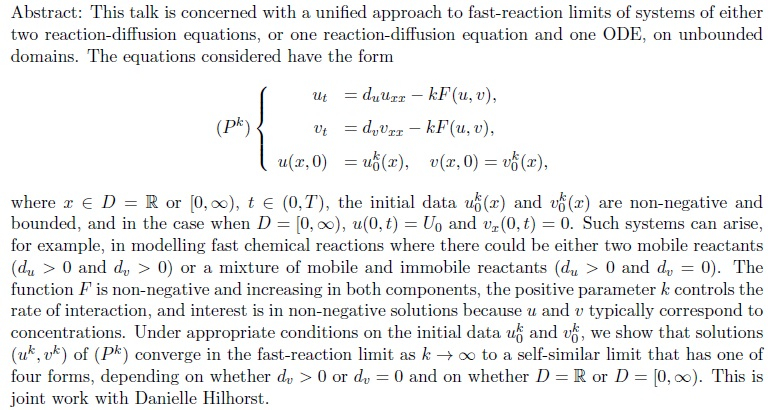LMS-WIMCS Analysis Day: Cardiff, 15th January 2014
15th January 2014
| Speakers | Accommodation | Travel | Timetable | Abstracts |
This will be the first of three meetings organized by the Wales Institute of Mathematical and Computational Sciences during 2014, sponsored by the London Mathematical Society. The meetings will take place in Aberystwyth, Cardiff and Swansea. This meeting, the first, will take place in Cardiff starting at 10:00 on Wednesday 15th January 2014 and the Scientific Programme will end by 17:30 on the same day.
Registration
Please send us an email with the subject 'LMS WIMCS Analysis Day' by Tuesday 7th January 2014 to register. Please include the following in the body of your email:
- your name and affiliation;
- state whether or not you wish to stay for dinner.
Speakers
| Speakers | Accommodation | Travel | Timetable | Abstracts |
The following have agreed to speak:
- Elaine Crooks (Swansea)
- Rolf Gohm (Aberystwyth)
- Carlo Mercuri (Swansea)
- Gennady Mishuris (Aberystwyth)
- Johannes Zimmer (Bath)
If you would like to give a talk, please contact the organizers.
Accommodation
| Speakers | Accommodation | Travel | Timetable | Abstracts |
Please book a hotel well in advance. Cardiff is a tourist destination and hotels can fill up. Some hotels which the School often uses are:
- Tane's Hotel, Newport Road.
- Town House Hotel, Cathedral Road.
- Lincoln Hotel, Cathedral Road.
- Hilton, 1 Kingsway, Cardiff CF10 3HH, tel: +44 (0)29 2064 6300.
- Parc Hotel, Park Place, Cardiff, CF10 3UD, tel: +44 (0)871 376 9011.
There are many other hotels online.
Travel
| Speakers | Accommodation | Travel | Timetable | Abstracts |
Click here for travel directions. The School of Mathematics is at 21-23 Senghennydd Road and is 200m from Cathays railway station. It takes 20-25 minutes to walk to the School from Cardiff Central railway station. The School of Mathematics is building 42 on this map.In the Google Map, the Mathematics Building is labelled 'Cardiff University' and indicated with a mortarboard symbol.
Timetable
| Speakers | Accommodation | Travel | Timetable | Abstracts |
- Registration will take place in room M/1.04 of the Mathematics Building.
- All talks will take place in room M/0.40 of the Mathematics Building.
- 10:10-11:00 Elaine Crooks (Swansea) Fast-reaction limits for some reaction-diffusion systems on unbounded domains
- 11:10-12:00 Rolf Gohm (Aberystwyth) Model theory for analytic functions and operator liftings
- 12:00-13:20 Lunch and Discussions
- 13:20-14:10 Carlo Mercuri (Swansea) Quasilinear elliptic problems involving the critical Sobolev exponent
- 14:20-15:10 Sergei Rogosin (Aberystwyth) Factorization of matrix functions
- 15:10-15:40 Coffee
- 15:40-16:30 Johannes Zimmer (Bath) From simple particle models to PDE dynamics
Abstracts
| Speakers | Accommodation | Travel | Timetable | Abstracts |
Fast-reaction limits for some reaction-diffusion systems on unbounded domains - Elaine Crooks (Swansea)

Model theory for analytic functions and operator liftings - Rolf Gohm (Aberystwyth)
We refer to the theory of functional models first developed by Sz.-Nagy and Foias in the 1950's and 60's to classify contractive operators and successfully generalised to tuples of operators by Popescu in the 1990's. In a different direction we found a generalisation where a larger class of analytic functions can be used to classify certain contractive liftings of contractive operators or operator tuples. By lifting we mean here: going from an operator C to an operator on a larger space which is a lower triangular 2x2-operator matrix with C in its upper left corner. This is joint work with S. Dey from Mumbai. We intend to explain the basic ideas of this approach and to report on recent progress.
Quasilinear elliptic problems involving the critical Sobolev exponent - Carlo Mercuri (Swansea)
We present some recent results on the variational analysis of some classes of quasilinear elliptic boundary value problems. In particular we show how to characterize the possible lack of compactness due to critical growth of the nonlinearities involved, in order to prove the existence of solutions.
Factorization of matrix functions - Gennady Mishuris and Sergei Rogosin (Aberystwyth)
The report is devoted to the survey of recent results in the area of Wiener-Hopf factorization (or, simply, factorization) of matrix functions. Such factorization means representation of a matrix function given on a closed curve on the complex plane in form of the product of three items (first, analytically continued into the inner domain, third, analytically continued into the outer domain, and the middle term being a diagonal matrix with power-type monomials). Preliminary information on the subject will be given. Main attention will be paid to constructive methods. The range of known application will be described.
From simple particle models to PDE dynamics - Johannes Zimmer (Bath)
One often aims to describe systems out of equilibrium by the governing energy E and entropy S, as well as the corresponding evolution laws for E and S. How can we derive these ingredients of the macroscopic evolution from particle models? In recent years, a dynamic scale-bridging approach has been developed and applied to a number of problems; large deviation theory plays an important role. The talk will present some of these results, in particular discuss the Vlasov-Fokker-Planck equation as a system driven by energy and entropy. Time permitting, an approach of deriving stochastic equations mimicking the fluctuations in underlying mesoscopic models will be sketched.